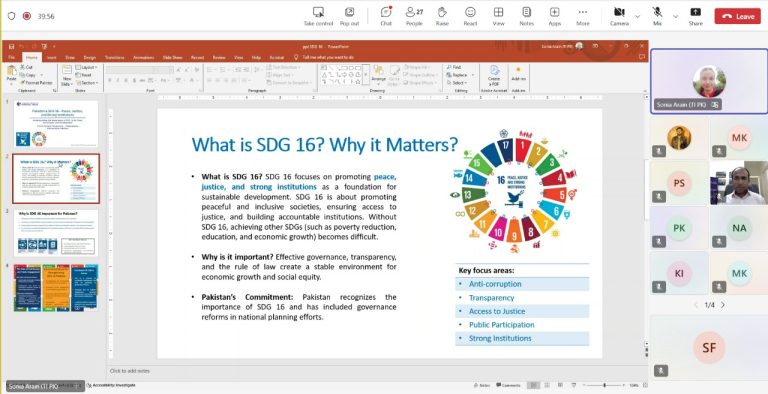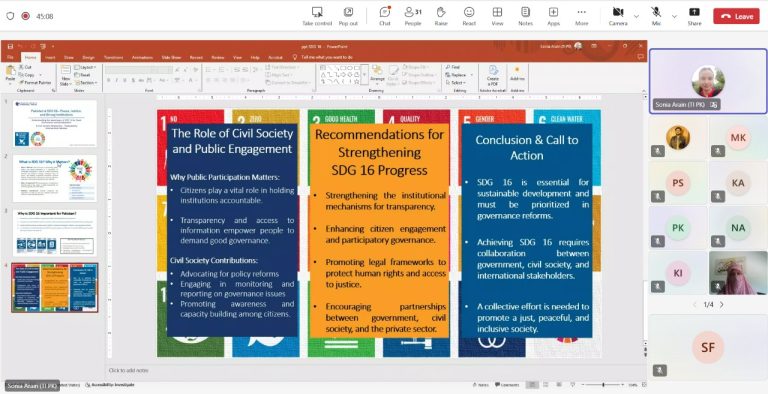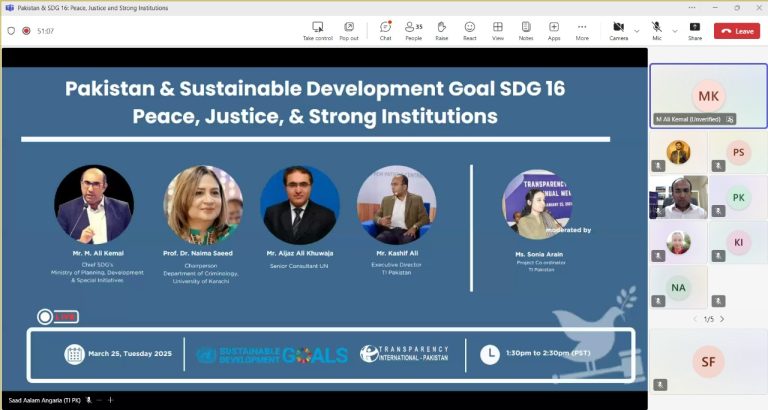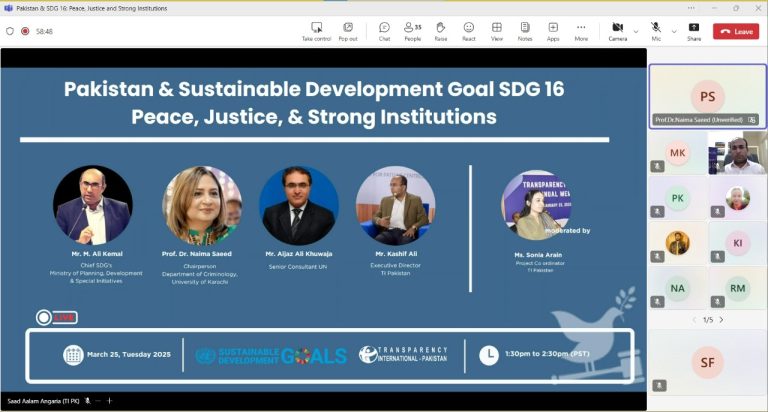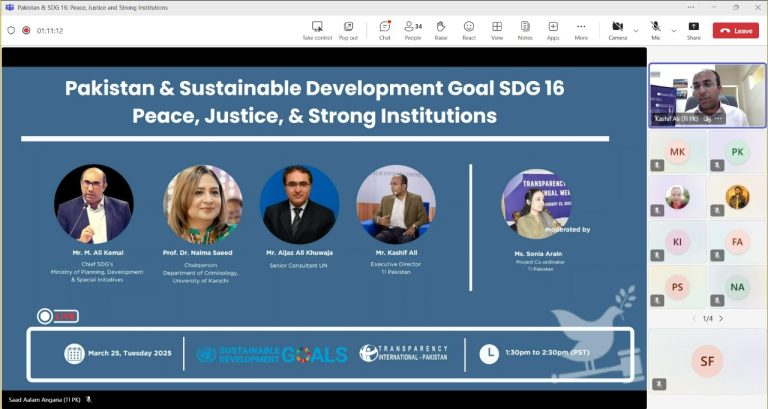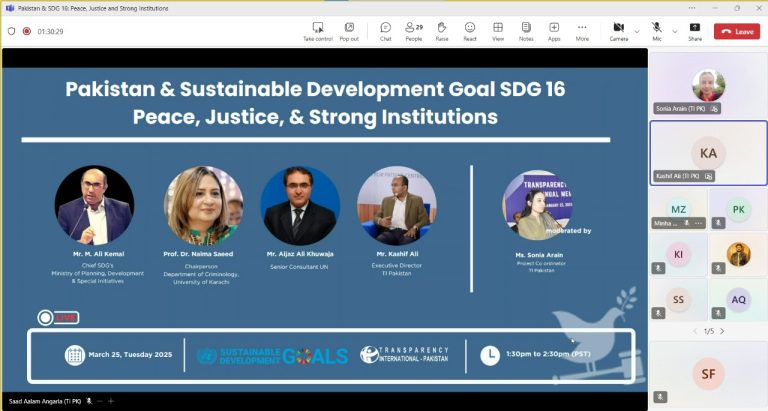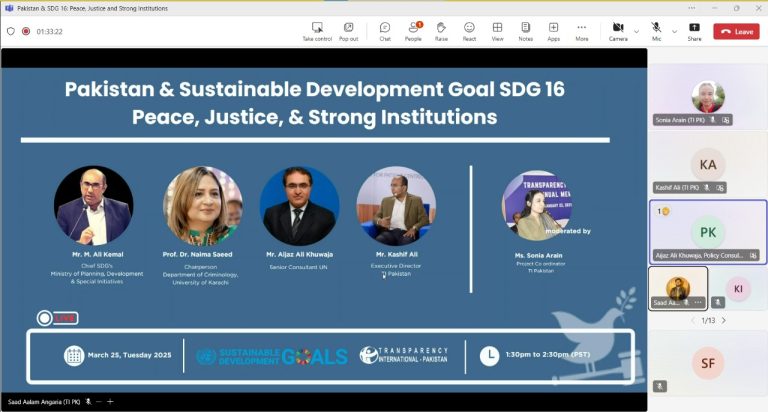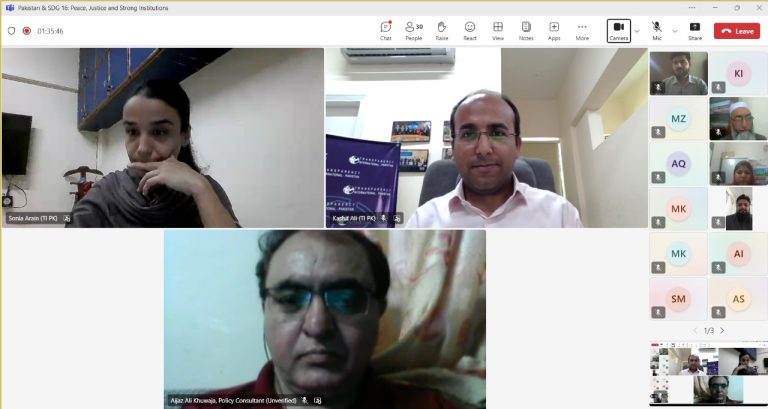Webinar: Pakistan & SDG 16 – Peace, Justice, and Strong Institutions
Webinar: Pakistan & SDG 16 – Peace, Justice, and Strong Institutions
Date: Tuesday, March 25, 2025
Platform: Teams (Online Event)
Transparency International Pakistan hosted a webinar titled Pakistan & SDG 16 – Peace, Justice, and Strong Institutions on March 25, 2024, via the Microsoft Teams platform. The event brought together experts from government, academia, and civil society to discuss the challenges and opportunities in strengthening governance, ensuring access to justice, and promoting peace in Pakistan. The webinar underscored SDG 16 as the foundation of sustainable development, emphasizing its role in driving economic prosperity, social equity, and institutional accountability.
Ms. Sonia Arain, Project Coordinator at Transparency International Pakistan, served as the moderator and welcomed participants, acknowledging their contributions to governance, transparency, and justice. She highlighted that corruption and weak institutions hinder economic growth and human rights, making strong institutions and accountability essential for Pakistan’s progress. She outlined the four key pillars of SDG 16: reducing violence, upholding the rule of law, ensuring access to justice, and promoting transparent institutions. Additionally, she emphasized Transparency International Pakistan’s advocacy efforts, awareness campaigns, and governance monitoring initiatives to advance SDG 16 in the country.
The discussion highlighted Pakistan’s progress on SDG 16, referencing the Voluntary National Review (VNR) reports from 2019 and 2022. While Pakistan has integrated SDG 16 into national frameworks, persistent data gaps remain on different indicators on SDg16. It was noted that only 43.3% of data related to SDG 16 is currently available.
Key Discussions and Panel Insights
- Mr. Ali Kemal (Chief SDGs, Ministry of Planning, Development & Special Initiatives)
Mr. Kemal emphasized that political instability and frequent leadership changes have severely hindered SDG 16 progress in Pakistan. Governance stagnation, weak access to justice, and rising violence were identified as major challenges, exacerbated by economic difficulties, with GDP per capita growth averaging only 1.3% to 1.5%. He highlighted that poverty and inequality contribute to increasing crime rates, while the lack of reliable data on corruption, illicit financial flows, and arms trafficking makes progress difficult to assess. He stressed the urgent need for data-driven policy action to strengthen governance and accountability.
- Prof. Dr. Naima Saeed (Chairperson, Department of Criminology, University of Karachi)
Dr. Naima Saeed underscored that strong institutions are the foundation of effective public service delivery. She highlighted that while laws exist, enforcement remains weak, leading to administrative inefficiencies. She stressed the critical role of education, academic institutions and research in fostering accountability and institutional integrity. Freedom of speech, access to information, and civic engagement were highlighted as essential components of governance reforms. Without addressing deep-rooted corruption and inefficiencies, achieving SDG 16 will remain elusive.
- Mr. Kashif Ali (Executive Director, Transparency International Pakistan)
Mr. Kashif Ali highlighted that SDG 16 carries enormous importance as a cross-cutting goal. It highlights that 2030 agenda and sustainable development is impossible without good governance and strong institutions. SDG16 provides a framework on how to tackle corruption, build inclusive institutions and promote peace and development. However, the key problem with SDG16 has been the absence of mechanisms for data generation and collection. He shared with the participants that in 2019, Pakistan submitted its first VNR to the UN High Level Political Forum, and the report did not mention SDG 16. In 2022 Pakistan submitted VNR for the second time and this time the report briefly talked about the SDG16. Therefore, the absence of data and absence of standardized mechanism and their adoption at federal and provincial levels is one big gap area on Goal 16 in Pakistan.
Mr. Kashif emphasized that in recent years, number of SDG 16 indicator sources have been linked with local data collection sources at federal and provincial levels. For instance, some targets of 16.1 such as 16.1.3 such as “Proportion of population experienced physical violence” is collected through PDHS, 16.6.2, “proportion of population satisfied with their last experience of public services” is collected under PSLM at national and provincial levels. Similarly, 16.10.2 looks at policy guarantees for “public access to information” which comes from national and provincial level commissions on RTI and the overall legal framework around RTI, the establishment of national human rights institutions and other similar bodies. However, data challenge remains when it comes to indicators related to institutions building, bribery, corruption, illicit financial flows, participation in decision-making etc. He called for greater collaboration between the government, civil society organizations (CSOs), and international bodies to enhance anti-corruption efforts and ensure effective SDG 16 implementation.
- Mr. Aijaz Ali Khuwaja (Senior Consultant, United Nations)
Mr. Khuwaja stressed that peace in Pakistan is unattainable without justice and strong institutions. He emphasized the need for digital governance, including e-government initiatives, mobile-friendly platforms, and online consultations, to engage citizens in policymaking. He highlighted the importance of local governance and decentralization, noting that while local governments exist, political instability has weakened their effectiveness. Empowering these institutions is crucial for achieving SDG 16. Transparency and accountability were central to his discussion, as he identified corruption as a major obstacle. He advocated open data policies, independent oversight mechanisms, and participatory budgeting to ensure government accountability. Civic engagement was also emphasized, with calls for participatory decision-making, community forums, and youth-driven initiatives to encourage citizen ownership of governance processes. He urged Pakistan to adopt international best practices in open government reforms, electoral integrity, and citizen-centric service delivery to make governance more participatory and responsive. With just six years remaining to achieve SDG 16, he stressed the need for immediate action in strengthening institutions and promoting inclusive decision-making.
During the he Q&A session session, speakers and participants focused on Pakistan’s progress in achieving SDG 16, challenges in data collection, and the role of civil society and NGOs in governance. A key concern raised was whether Pakistan had improved in SDG 16 implementation, referencing VNR reports from 2019 and 2022. The discussion revealed that data coverage remains at only 43.3%,
Another key issue discussed was the engagement of CSOs and NGOs in SDG 16 implementation. Overall localization and reporting on SDG16 remains weak. The lack of coordination between government and private institutions was cited as a major obstacle, particularly in areas like citizen experiences with service delivery, corruption and bribery. Budget tagging for SDGs and climate action alignment in public spending was also highlighted as an important steo. It was highlighted that while budget frameworks now include SDG considerations, internal data remains inaccessible, limiting civil society’s ability to scrutinize spending effectiveness. The need for a centralized reporting dashboard at the district level was identified as a crucial step toward improving collaboration and data accuracy.

